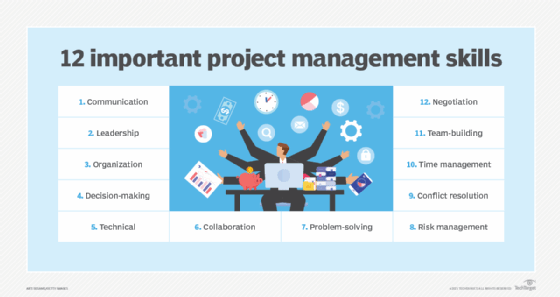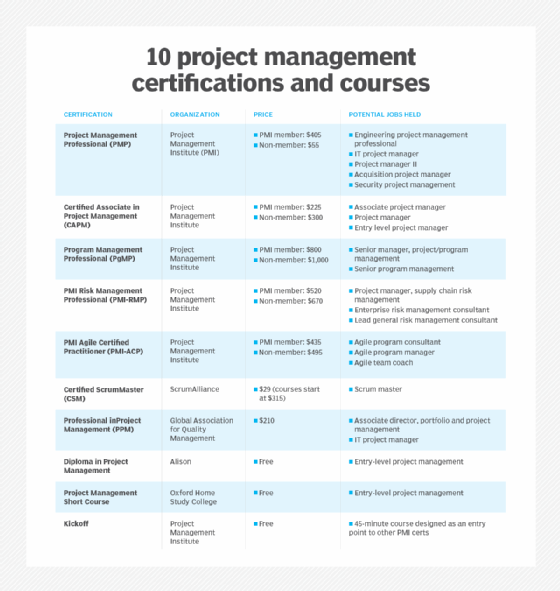What is an IT project manager?
An IT project manager is a professional charged with overseeing the process of planning, executing and delegating responsibilities related to an organization's information technology (IT) pursuits and goals.
IT project managers may work in a variety of industries, as nearly all organizations rely on computing technologies. Some organizations establish IT project management offices to guide the completion of large-scale initiatives.
What does an IT project manager do?
An IT project manager should support business directives associated with specific initiatives and assign resources based on those goals. As project participants are often spread across different offices and teams, the role of the IT project manager is to ensure that projects are delivered smoothly on-time and on-budget with minimal interruptions to the work.
The types of projects an IT project manager may be responsible for include the following:
- Software development.
- Mobile application development.
- Web development.
- Database management.
- Backup and recovery.
- Cloud migration.
- Software implementation.
- Hardware installation.
- Network configuration.
- Security management.
- Infrastructure management.
- Digital transformation.
- Artificial intelligence (AI).
IT project manager tasks may include the following:
- Project planning, setting goals, project milestones and completion plans.
- Maintaining schedules and budgets for each project.
- Managing team members.
- Distributing tasks to project team members.
- Presenting project plans.
- Tracking the progress and performance of team members.
- Assessing and taking proper action to account for risk.
- Leading meetings between teams and other stakeholders.
- Communicating project activities to team members, senior management and stakeholders.

Project management activities
The following five processes must be addressed across the project management lifecycle:
- Initiation. These activities include defining a problem that must be solved, establishing the project scope and objectives, securing senior management approval and funding, creating a project team and charter, and determining which tools will be used and if external support will be needed.
- Planning. Once the project has been approved and the team has been established, project activities, phases and steps must be defined. This is also where the PM methodology (e.g., Waterfall, Agile) is selected and the project plan is established and approved. As the project progresses, further planning may be needed to address issues (e.g., scope creep) that may occur.
- Execution. When the project plan and its associated timeline is completed, project execution begins. As each milestone of the project is completed, senior management briefings are essential to ensure continued support. Issues that may negatively impact the project's success must be addressed as quickly as possible, along with updating senior management.
- Project monitoring. Among the key duties of a PM are to ensure that the project is on time and within its budget. Important metrics to monitor include project timing, cost, scope, quality, risk, staffing and other factors.
- Project closeout and reporting. As each project phase is completed, a review should be performed to ensure the project continues on time and within budget. Once the project has been completed, a review determines that all project activities have been completed, that all issues are resolved and how well the project team managed project time and expenses. A formal report on the project should be prepared and submitted to senior management, along with a briefing, if needed.
Project knowledge requirements
In addition to the skills and qualifications discussed in this article, PMs need access to specific project knowledge:
- Managing project scope. Once a project's scope and objectives have been defined and approved, any changes must be evaluated and decisions made on whether the scope can be adjusted.
- Project timeline and resource scheduling. Once the project has been approved, the timings for each step and the required resources (e.g., staffing and technology) must be regularly examined to ensure that resources are available and adherence to the timeline continues.
- Expense management. Assuming a project budget has been developed and approved, ongoing monitoring of expenditures is essential to ensure that cost overruns are minimized.
- Ensuring project quality. Successful projects focus closely on quality across the project lifecycle. If possible, quality metrics should be established during project plan development. PMs should monitor quality performance as part of their daily activities.
- Staffing management. A key activity for PMs is monitoring the performance of project team members. PMs must ensure that team members complete their assignments correctly and on time. They must also address and resolve any issues among team members that affect project activities.
- Communications during the project. Senior managers and stakeholders concerned about the project need to know that the project is moving according to plan. PMs need to know the key influencers, and establish a communications process to keep them informed throughout the project lifecycle.
- Managing project risk. Risks, threats and vulnerabilities can negatively impact project completion if they are not identified and mitigated. PMs must identify risks, determine the likelihood of them occurring and define steps to mitigate or eliminate them.
- Resource procurement activities. Ideally a project plan should have a procurement plan that identifies potential (or actual) investments in resources needed to achieve project goals. PMs may or may not have the authority to execute purchase orders for resources. If the organization has a purchasing or procurement department, the PM must coordinate with that department.
- Managing stakeholders, senior managers and key success influencers. Ensuring that interested parties associated with a project -- regardless of their title or position -- are kept informed about the project's progress is an essential PM activity. Knowledge of the key parties and their interests can help address and alleviate any specific concerns they may have.
- Cross-activity coordination. PMs need to coordinate multiple activities, team members, vendors, stakeholders, senior managers and others. If one aspect of a project becomes troublesome, it could impact other project activities. Knowledge of all aspects of the project -- especially how the different activities interact with each other -- ensures the project is properly planned and managed.
- Project completion and reporting activities. The PM must be confident that all aspects of the project have been completed correctly, on time and within budget. As the system associated with the project nears completion, the PM must be prepared to confirm that the system has been completed and is ready for production. This includes preparing reports specifying that the project has been completed and scheduling meetings with senior management and stakeholders on project completion.
How do you become an IT project manager?
IT project manager positions and career paths typically require a mix of technical and soft skills. While a strong technical background is necessary, job descriptions also ask for non-technical skills such managing tasks, scheduling and providing detailed plans.
Education requirements. To be considered for an IT project manager position, entry-level candidates should have at least a bachelor's degree in computer science, IT or a related field. While some positions may accept candidates with an associate degree or the equivalent experience, a bachelor's degree is typically preferred.
Advanced degrees in business management, technology management or professional project management certifications, such as Project Management Professional (PMP) or Certified Associate in Project Management (CAPM) from the Project Management Institute or the Certified ScrumMaster from ScrumAlliance, may be required or preferred by employers.
Project management experience. IT project managers must demonstrate increasing responsibility for larger and more complex projects during their careers. Experience managing a variety of information systems, especially as a technical project manager, is essential. PMs may need to demonstrate leadership experience as a program manager, handling a wide variety of related tasks associated with a specific initiative.
Effective PMs achieve results by managing project timelines across a project's lifecycle, use their communications skills to satisfy project goals and demonstrate effective use of project management tools like Microsoft Project. Today's PMs must also demonstrate their experience in areas including, but not limited, to risk management, digital automation and cybersecurity.
Skills. Employers are generally looking for candidates with the following technical and soft skills:
- Advanced knowledge of computers, computer systems, software and network technology.
- Communication and leadership skills.
- Analytical problem-solving skills.
- Proven project management skills.
- Familiarity with one or more project management methodologies.
- Organization and time management skills.

For more information about how to land an IT project manager job, see our guide on IT project manager interview questions to see what employers are likely to ask their candidates.
How much do IT project managers earn?
According to ZipRecruiter, the average annual IT project manager salary in 2024 is $113,676. While this is the average for all IT project manager positions, salaries for individual roles may vary based on factors such as geographic location, experience, education level, certifications and industry.
IT project management methodologies
IT project managers often use project management methodologies or frameworks to guide practices. Popular project management methodologies used for IT projects include the following:
- Agile. This framework relies on short delivery cycles. It is often employed for projects where speed and flexibility are priorities.
- Waterfall methodology. With this approach, work flows sequentially between defined phases and work stations. In the Waterfall model, work only moves to the next phase after completion of the previous phase.
- Scrum. Scrum places a focus on transparency, inspection and adaptation. Scrum encourages iterative progress, accountability and teamwork. Work is broken down into short sprints.
- PRINCE2. This project management framework involves lots of early stage planning, combining practices from a variety of backgrounds and industries.
- Traditional project management. This approach draws principles from the Project Management Body of Knowledge guide, designed around three phases of a project: inputs, tools and techniques, and outputs.
- Lean. Lean focuses on reducing unnecessary waste in resources and optimizing processes for efficiency.
Are IT project managers in demand?
With digital transformation efforts fueling the growth of technologies such as cloud and big data across all industries, IT project managers are needed to facilitate projects such as cloud migration and application development.
Gartner estimates that worldwide IT spending will grow 7.5% from 2023, reach $5.26 trillion by the end of 2024 and increase to $7 trillion by 2028. With this continued increase in IT spending, IT project manager positions can be expected to grow to handle implementing new technologies.
The impact of AI on the future of IT project management
While the future of IT project management is strong, the impact of AI on the profession has already been significant. AI has many demonstrated uses in project management, ranging from identifying potential project issues before they occur to providing insights on project resources and potential shortfalls. Additional benefits include time savings and greater knowledge of all aspects of the project lifecycle in real time.
AI-enabled PM systems will likely be important tools for PMs in the coming years. Activities potentially enhanced by AI include project scheduling, cost management, resource management, problem identification, risk management, generation of project analytics and project reporting.
For in-depth information on the Agile project management methodology, watch our webinar with Global Knowledge.







